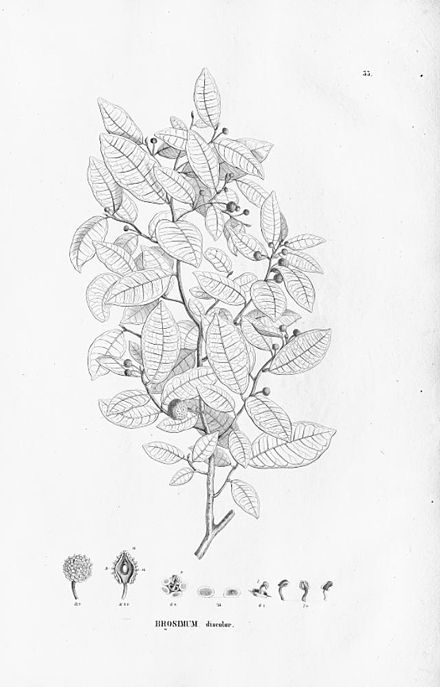Brosimum
| Brosimum | |
|---|---|

| |
| Brosimum guianense parts drawing | |
| Scientific classification | |
| Kingdom: | Plantae |
| Clade: | Tracheophytes |
| Clade: | Angiosperms |
| Clade: | Eudicots |
| Clade: | Rosids |
| Order: | Rosales |
| Family: | Moraceae |
| Tribe: | Dorstenieae |
| Genus: | Brosimum Sw. (1788)[1] |
| Species[2] | |
|
19, see text | |
| Synonyms[2] | |
| |
Brosimum is a genus of plants in the family Moraceae, native to tropical regions of the Americas.
The breadnut (B. alicastrum) was used by the Maya civilization for its edible nut. The dense vividly colored scarlet wood of B. paraense is used for decorative woodworking.[3] B. guianense, or snakewood, has a mottled snake-skin pattern, and is among the densest woods, with a very high stiffness; it was the wood of choice for making of bows for musical instruments of the violin family until the late 18th century, when it was replaced by the more easily worked brazilwood (Paubrasilia echinata). Plants of this genus are otherwise used for timber, building materials, and in a cultural context.
Bufotenin has been identified as a component in the latex of the takini (Brosimum acutifolium) tree, which is used as a psychedelic by South American shamans.[4]
Species
19 species are accepted.[2]
- Brosimum acutifolium Huber – tamamuri
- Brosimum alicastrum Sw. – breadnut, Maya nut, ramón (Spanish)
- Brosimum amazonicum (Poepp. & Endl.) E.M.Gardner & Zerega
- Brosimum costaricanum Liebm.
- Brosimum gaudichaudii Trecul — Mama-cadela
- Brosimum glaucum Taub.
- Brosimum glaziovii Taub.
- Brosimum guianense (Aubl.) Huber ex Ducke – snakewood (= B. aubletii)
- Brosimum lactescens (S.Moore) C.C.Berg
- Brosimum longifolium Ducke
- Brosimum melanopotamicum C.C.Berg
- Brosimum multinervium C.C.Berg
- Brosimum parinarioides Ducke
- Brosimum parinarioides ssp. amplicoma (Ducke) C.C.Berg (= B. amplicoma)
- Brosimum parinarioides ssp. parinarioides
- Brosimum potabile Ducke
- Brosimum rubescens Taub. — satine bloodwood
- Brosimum sprucei (Baill.) E.M.Gardner & Zerega
- Brosimum steyermarkii (C.C.Berg) E.M.Gardner & Zerega
- Brosimum utile (Kunth) Oken (= B. galactodendron)[5]
Formerly placed here
- Pseudolmedia spuria (Sw.) Griseb. (as B. spurium Sw.)[5]
Footnotes
- ^ "Genus: Brosimum Sw". Germplasm Resources Information Network. United States Department of Agriculture. 2009-01-16. Retrieved 2010-11-23.
- ^ a b c Brosimum Sw. Plants of the World Online. Retrieved 22 April 2024.
- ^ Baker (2004)
- ^ Moretti C, Gaillard Y, Grenand P, Bévalot F, Prévosto JM (June 2006). "Identification of 5-hydroxy-tryptamine (bufotenine) in takini (Brosimumacutifolium Huber subsp. acutifolium C.C. Berg, Moraceae), a shamanic potion used in the Guiana Plateau". Journal of Ethnopharmacology. 106 (2): 198–202. doi:10.1016/j.jep.2005.12.022. PMID 16455218.
- ^ a b "GRIN Species Records of Brosimum". Germplasm Resources Information Network. United States Department of Agriculture. Archived from the original on 2009-01-20. Retrieved 2010-11-23.
References
- Baker, Mark (2004): Wood for Woodturners. Guild of Master Craftsmen Publications, Sussex. ISBN 1-86108-324-6